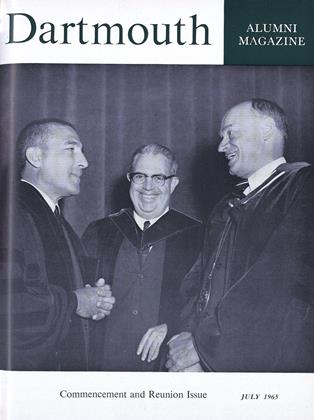By MilesV. Hayes. Lunenburg, Vt.: The StinehourPress, 1964. 86 pp.
The complexity of modern society has forced us to develop a cliquish professionalism among the leaders of almost every aspect of our living. Most of us are really unable to make valid judgments about many aspects of our cultural surroundings but rely almost wholly on the opinion of "experts" whose judgments for one reason or another we accept and are willing to act by. I know nothing about abstract art. When I wander through a modern art gallery I like what I see in general, but if on the walls the gallery director had interpolated the dabbling of a child, I, along with most other viewers, would not be able to distinguish between the work of a disciplined artist and the product of childish play. With most other people, I am willing to be guided by the qualified professional whose talents are directed toward producing for society a product of lasting value.
There are, of course, many threats implicit to society if leadership in specific areas falls entirely into the hands of professional cliques, since almost by necessity each group educates its members in its own thinking, develops its own rules for validating standards, and passes on to its own disciples its own criteria of credibility.
Scientists are of course no exception to these general statements, for who but a physicist would be asked to review a volume which begins: "the universe consists of a complex qaternionic field which is a function of space-time such that in the sense defined by the algebra of complex quaternions its rate of change is proportional to the square of its magnitude.. ."? Yet I as a physicist feel unsure of my ground when I react like most other professional physicists in rejecting as specious the unified field theory of Professor Miles V. Hayes. The author presents the philosophical implications of his theory as well, in terms of immortality, free will, evolution, and the interaction of science and religion. However, the language is far too technical and mathematical for philosophers to cope with so that it is doubtful whether they can act as judges on the validity of this aspect of the work.
Professor Hayes has himself told the story of his battle with the physics profession in his introductory "Viewpoint." He begins: "The work I commence is a description of the physical and metaphysical foundations of an engineer's philosophy. My viewpoint is primarily philosophical and secondarily physical. I want to see life whole and in proportion. I wish to coordinate in a single theory, as best I can, the demonstrable and observable facts of science, and, where demonstrable facts are unavailable as in the realm of mind and value, the working hypothesis or articles of faith that seem to me most plausible."
The whole effort is a classic illustration of a sincere man trying to "beat the system." Having been denied the normal publication route for professional physicists, Professor Hayes obtained the assistance of the Shell Company Foundation, Inc. and had his small volume printed privately. He had printed 400 numbered copies - sent the first 33 to all the living Nobel laureates in physics, number 34-199 to the Chairmen of the Physics Departments of the appropriate number of leading universities in the world, the next 80 to an appropriate list of libraries, and the remaining copies to an assorted number of people including the Dartmouth faculty.
What has been accomplished? Only time will tell.
It may, in fact, be true that Professor Hayes has found the unified field theory which men like Albert Einstein labored a lifetime unsuccessfully to develop. I myself do not believe so, but great ideas are often disbelieved by contemporary practitioners of an art. Unconventional attacks on problems may often be set aside and disregarded just because they are out of tune with the age in which they are born. This may be true with the present theory, despite my own profound skepticism. Future generations will judge me if I am wrong.
Professor of Physics andAssociate Dean of theGraduate School at M.I.T.
 View Full Issue
View Full Issue
More From This Issue
-
 Feature
FeatureThe Quest for Quality
July 1965 By STEWART LEE UDALL, LL.D. '65 -
 Feature
FeatureSidney Chandler Hayward '26
July 1965 -
 Feature
FeatureChange and Challenge
July 1965 By HAROLD KING DAVISON '15 -
 Feature
FeatureTucker Heads Alumni Council
July 1965 -
 Feature
FeatureAlumni Awards
July 1965 -
 Feature
FeatureHONORARY DEGREE CITATIONS
July 1965
Books
-
 Books
BooksCOURTSHIP AND MARRIAGE,
November 1949 By Andrew G. Truxal -
 Books
BooksTHE DYNAMIC UNIVERSE
JANUARY 1932 By Charles A. Proctor -
 Books
BooksV AS IN VICTIM
December 1945 By H. M. Dargan. -
 Books
BooksFINLAND ON FIFTY DOLLARS
October 1938 By Harold G. Rugg '06 -
 Books
BooksTHE CHURCH BEAUTIFUL
May 1946 By Rev. Chester B. Fisk. -
 Books
BooksTHE BROWN DECADES.
MARCH 1932 By W. K. Stewart

